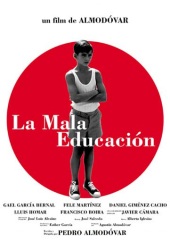|
Bad Education
aka La Mala Educación |
| |
 |
Spanish language. Spain, 2002. Not rated. 84 minutes.
Cast: Gael García Bernal, Fele Martínez, Javier Cámara, Daniel Giménez-Cacho, Lluís Homar, Francisco Boira, Francisco Maestre, Juan Fernández, Ignacio Pérez, Raúl García Forneiro, Petra Martínez, Alberto Ferreiro
Writer: Pedro Almodóvar
Music: Alberto Iglesias
Cinematography: José Luis Alcaine
Producer: Agustín Almodóvar, Pedro Almodóvar
Director: Pedro Almodóvar
LINKS
|
 ll About My Mother and Women on the Verge of a Nervous Breakdown have established a reputation for acclaimed Spanish director Pedro Almodóvar as a women's director—despite ill-placed charges of misogyny generated by films like Matador; Tie Me Up, Tie Me Down; and Talk to Her. (In fact, the latter film's subtext clearly decries a world that reduces women to passive, dependent participants). Almodóvar's films have celebrated women and, populated as they are by transsexuals and kink, explore what it means to be a woman or to become a woman, both emotionally and sexually.
ll About My Mother and Women on the Verge of a Nervous Breakdown have established a reputation for acclaimed Spanish director Pedro Almodóvar as a women's director—despite ill-placed charges of misogyny generated by films like Matador; Tie Me Up, Tie Me Down; and Talk to Her. (In fact, the latter film's subtext clearly decries a world that reduces women to passive, dependent participants). Almodóvar's films have celebrated women and, populated as they are by transsexuals and kink, explore what it means to be a woman or to become a woman, both emotionally and sexually.
It's only natural, however, that that sooner or later Almodóvar would make a film that, instead of exploring womanhood, examines his own reality of being a gay man. While it does have the requisite transvestites, Bad Education is almost completely devoid of women. Almodóvar himself acknowledges he has been working on the story of Bad Education for many years, and while the film is not autobiographical in its details, it is autobiographical in spirit. Almodóvar junkies will be able to trace the film's origins to a scene from Law of Desire (1986), in which a transsexual visits the priest who abused her as a child. It's probably good that Almodóvar took so long to make Bad Education, because the film is so unabashedly and explicitly homosexual that it could never have been made twenty years ago.

Gael García Bernal stars in Bad Education. |
Lately Almodóvar has been rewarded and praised for becoming a more “mature” director, which is code for suppressing his outrageous fetishism. However, with the bold opening credits, a montage of newspaper clippings in audacious red, white, and black, accompanied by loud, old-fashioned noir chords, Almodóvar trumpets a return to his obsessions. He will not tone them down, not this time. Bad Education will be a film that contains all the twisted sexuality and black humor of his earlier films, Almodóvar seems to be saying. That proves to be the case, but it doesn't mean that Bad Education is any less sophisticated or mature than Talk to Her or All About My Mother.
Foregoing exposition, Bad Education opens in typical Almodóvar fashion—strong, strange, and colorful. We fade in on Enrique Goded (Fele Martínez, who appeared in Talk to Her), a filmmaker in search of his next story. He and his production director Martin (Juan Fernández) go through newspaper clippings, reading a story about a man on a motorcycle who dies but continues riding for sixty miles. Just like in a classic noir (say, The Maltese Falcon), they are interrupted by an unexpected visit. The visitor (Gael García Bernal of Amores Perros, Y tu mamá también, and The Motorcycle Diaries) introduces himself as Ignacio, Enrique's former schoolmate, but insists on being called by his stage name, “Angel.” Enrique is coolly polite. They chat for a few awkward minutes. Angel hands him a script and leaves. Martin then questions Enrique about their odd caller. Enrique tells him Ignacio was his first love.
Enrique starts to read the script, and like the noir private eye who takes the wrong case, there is no turning back. The story captivates him. Angel captivates him. But even after finishing the script and initiating flirtations with Angel, both remain a mystery to him. He wants to make the film but even as he begins shooting, he is aware there is still something unsolved, something unknown to him.

Fele Martínez stars in Bad Education. |
Back and forth the timelines go, until you realize that you are watched three interwoven and inextricably linked interpretations of reality—objective reality, the story in Angel's script, and the final film realized by Enrique. In one plotline, Enrique (Raúl García Forneiro) and Ignacio (Ignacio Pérez), have their first sexual experiences together as boys at a Catholic boarding school, but are ripped apart by Father Manolo (Daniel Giménez-Cacho), the priest who is molesting Ignacio. In another, the adult Ignacio's alter-ego, the transvestite Zahara ( García Bernal again), attempts to blackmail Father Manolo. In the third, Enrique initiates a sexual relationship with Angel (who is determined to prove he can play Zahara in Enrique's film) and grows more obsessed with learning the truth behind the script and his own childhood memories, until he receives a visit from the mysterious Mr. Berenguer (Lluis Homar).
Almodóvar films don't unfold so much as they unpeel. As more and more information falls into place, the film's events, situations, and dialogue gain meaning. The structure is similar to Talk to Her, but even more ambitious and complex, and replete with noir references throughout. Angel and his alter ego Zahara turn out to be the femme fatale, leading the men obsessed with them to ruination. The film nonetheless boasts Almodóvar's trademark humor—two boys have their first sexual experience together during a movie called “That Woman.” A man falls asleep during oral sex. A boy declares himself to be a “hedonist”—it's a term he read in an encyclopedia.
Almodóvar's vision is strongly supported by José Luis Alcaine's arresting camerawork and courageous acting. In his challenging dual role and doing a Castilian Spanish accent to top things off, García Bernal will now be officially labeled by every film critic in the world as “fearless.” Now that he's crossed the Atlantic, he will no doubt become a fixture in Spanish-language cinema on both sides of the ocean. Actors who can carry Almodóvar's difficult material should not end up in the unemployment line.
Only two criticisms can be leveled at Bad Education. First—and this is a small quibble—Almodóvar's decision to put postscripts on the screen is a cheap tactic. Bad Education is a work of fiction, so if the postscripts are nothing more than a pretense. If they tell the audience something integral to the story, then it should be put in the story. Otherwise, the audience should be allowed to decide for itself how it thinks the characters have changed and what road they will travel.
The second criticism is a larger one. By making a film so personal to himself, so unapologetically immersed in his fetishes and obsessions, Almodóvar has also created a rather insular film. Bad Education is expertly constructed and intrepidly realized, but it doesn't resonate like All About My Mother or Talk to Her. It doesn't pack the same emotional wallop—or, at least, it won't for most people. Almodóvar is still a master auteur on top of his game, though, so even if the finished product isn't quite as universally compelling or successful as his previous two, it's still well worth your time... unless you're Jerry Falwell or Pat Buchanan, in which case you'll be suffering conniption fits by the end of the first half hour.
Review
© October 2004 by AboutFilm.Com and the author.
Images © 2004 Sony Pictures Classics. All Rights Reserved.



